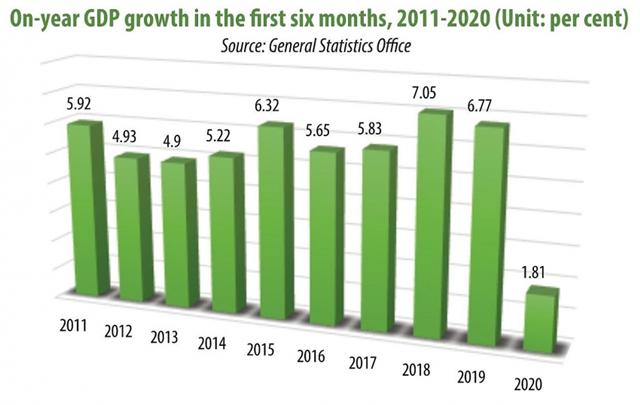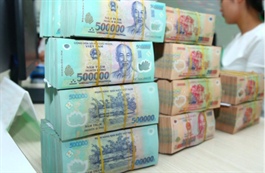Further support enacted for strained enterprises
Further support enacted for strained enterprises
With the economy growing at the lowest six-month rate since 2011, the government is quickening practical support for enterprises to soon bring them out of difficulties as part of an effective measure to spur on economic growth for the whole year.
|
Minister of Planning and Investment Nguyen Chi Dung told a government-led teleconference with ministries and localities nationwide last week that to boost production and business, support enterprises, and increase economic growth, the government may seek permission from the Party’s Secretariat to establish a national committee on fighting economic slowdown for the first time.
The committee, whose head will be the prime minister and other members will be representatives of agencies in the political system, will be in charge of studying and proposing sturdy policies in favour of enterprises and people, so that they can escape difficulties as soon as possible and the economy can recover soon. Other groups will also be established that specialise in supporting enterprises at this time.
Prime Minister Nguyen Xuan Phuc told the teleconference, “It is now quite imperative for the whole country to recover economic growth, following a low 1.81 per cent growth rate in the first half of 2020. Greatest efforts must be made to weather all difficulties to maximise the accomplishment of the growth target.”
Last November, the National Assembly set a target of 6.8 per cent in economic growth for 2020. It is calculated that a 1 per cent growth rate will create an additional 400,000 jobs.
“The drivers of growth include investment, exports, and consumption. To push up growth, one of the key solutions now is to provide stronger support for enterprises. All pro-business assistance packages must be expedited soon,” PM Phuc stated.
Last week, he ordered implementation of the Law on Supporting Small- and Medium-sized Enterprises, which has almost been at a standstill since it took effect at the beginning of 2018. This has made it hard for the law to act as an important driver of such enterprises (SMEs) which number over 700,000 now, or 97 per cent of Vietnam’s total number of enterprises.
“There must be revised guiding documents and more solutions to materialise the law,” PM Phuc said, while also ordering the Ministry of Finance (MoF) to provide guiding documents to implement the National Assembly’s recently-enacted resolution on reducing 30 per cent of corporate income tax for 2020 for micro- and small-sized firms.
Over the past few months, the government has also been deploying some drastic measures to support companies. Specifically, the State Bank of Vietnam has been deploying a package worth over VND300 trillion ($13 billion) for both enterprises and households in the form of debt payment deferral and preferential loans.
The MoF has also been implementing a VND180 trillion ($7.82 billion) package for individuals and companies, while the government has also been carrying out a VND62 trillion ($2.7 billion) package to specifically support poor and unemployed people.
However, Minister Dung said almost all businesses are now having big woes.
“Figures from a recent survey show that enterprises of all sizes are facing massive difficulties, especially in cash flows,” he said. “Though the government and the prime minister, and ministries have enacted and implemented various measures to assist businesses, many have been unable to benefit from such support. Some policies have yet to be materialised.”
According to Ousmane Dione, former country director for Vietnam of the World Bank, reforms to promote domestic private sector development will need to be significantly stepped up, making it a primary driver for improved productivity and economic growth. This entails continued effort to remove obstacles to private business and strengthen the regulatory environment,” Dione said. “Despite notable reforms, complicated procedures remain and are preventing enterprises from growing more.”
The government reported that the economy grew 1.81 per cent in the first half of the year, the lowest six-month growth level over the past decade. Of which, the agro-forestry-fishery, industrial and construction, and service sectors rose 1.19, 2.98, and 0.57 per cent on-year, respectively.
Notably, 12 localities suffered from below-zero growth as they depend largely on services, including Vinh Phuc, Bac Ninh, Hoa Binh, Danang, Quang Nam, Phu Yen, Khanh Hoa, Ba Ria-Vung Tau, Ben Tre, Hau Giang, Soc Trang, and Ca Mau.


























